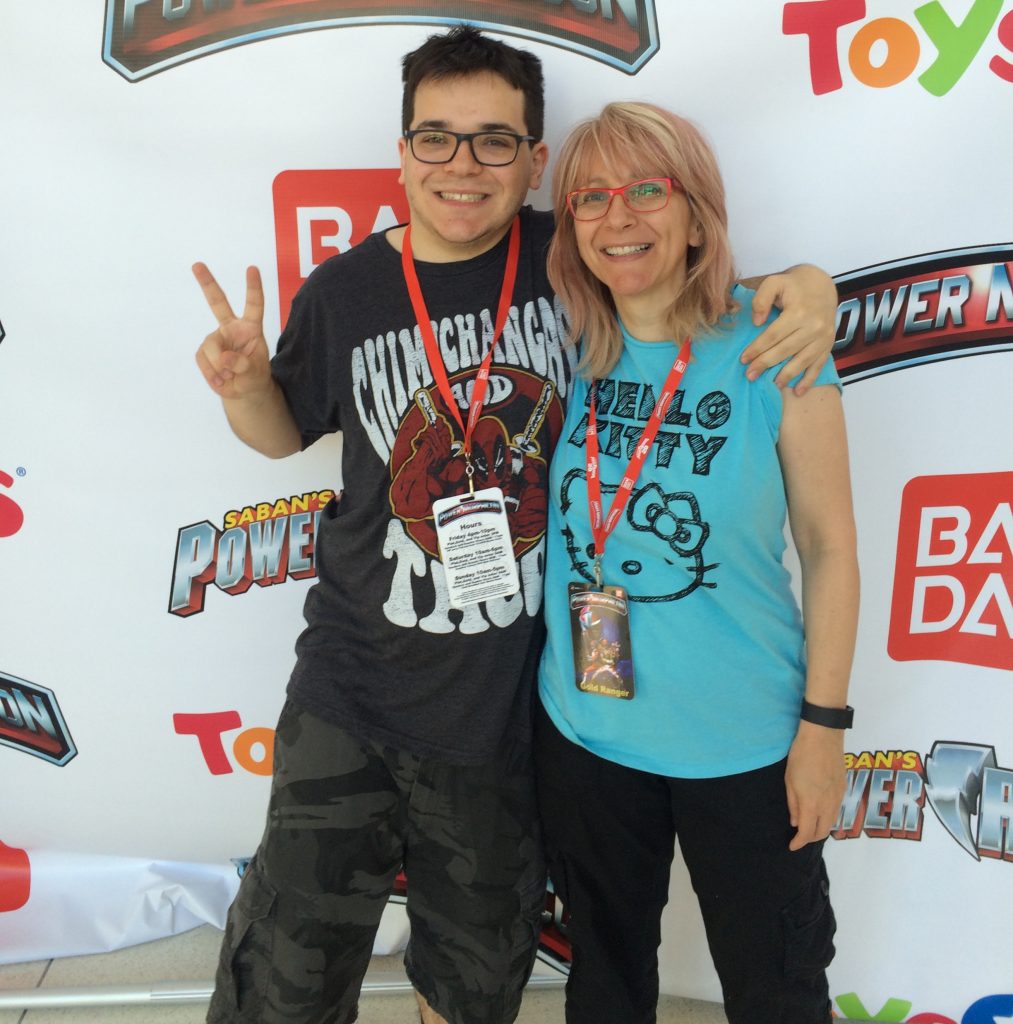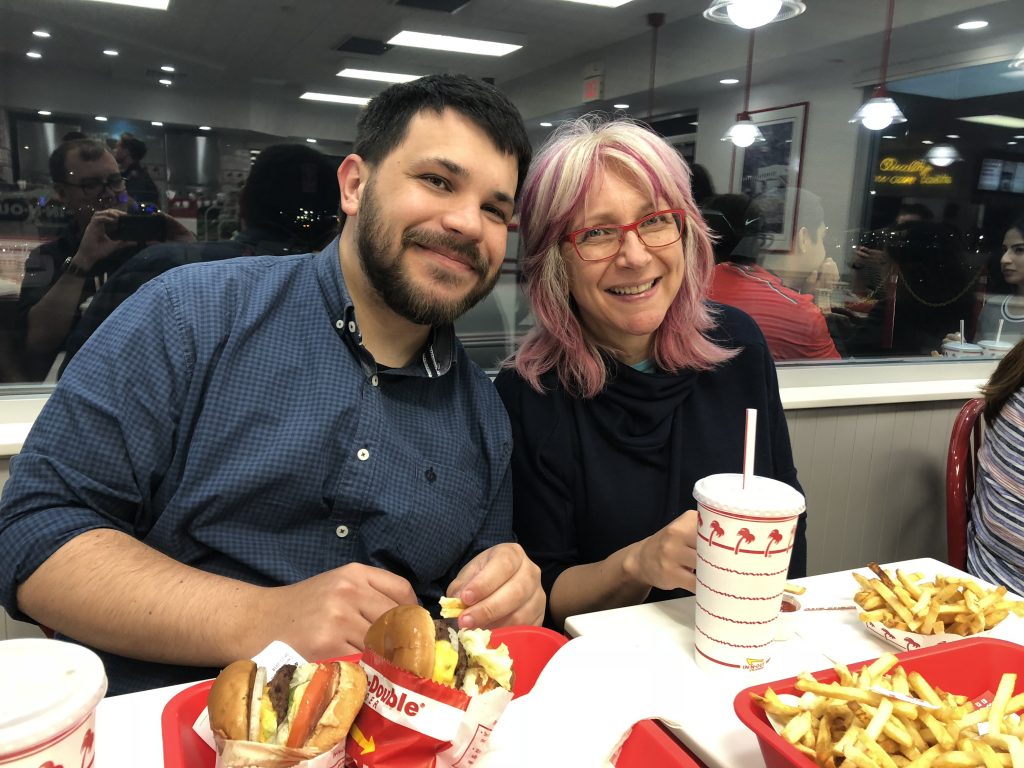
Professor Sandra Jones is an autistic mother of two autistic sons and Pro Vice-Chancellor (Engagement) at Australian Catholic University. She has studied autistic adolescent development, the impact of diagnostic labels, and the development and evaluation of social support and peer support programs. In Part One of her interview, she shared her experience obtaining a late diagnosis and how she is raising her sons to achieve the same positive self-image.
How did you first become aware of your diagnosis? When/how did you develop a positive autistic identity?
Like many women, I had a very late diagnosis. I grew up at a time when awareness of autism was low, and recognition of autistic girls was even lower. I was (to paraphrase a book title) “nerdy, shy and socially awkward.” I was aware from a very young age that I was different to my sisters, and different to other kids at school. My parents and teachers generally attributed my social difficulties to being introverted. My peers thought I was weird and I was equally convinced that they were, so I focused on my school work and reading mountains of books. I achieved high marks in all of my classes and was very obedient so I wasn’t a ‘problem.’ At school and at home I learned that many of my natural behaviours and thoughts were seen as odd or unacceptable, so I learnt to hide much of who I was to make other people feel comfortable and to stay out of trouble. As I progressed through adolescence and adulthood, the differences between me and everyone else became even more obvious, and I worked even harder to hide them.
Then I became a mum. My first son had some difficulties in daycare and preschool, with the teachers expressing the view that he had ADHD due to his energy levels and non-typical behaviours. I thought he was perfect the way he was, but he quickly learned to behave like everyone else (a pattern I should have recognised). My second son had more significant challenges, and at two years old was diagnosed as autistic. As the boys moved through school, from time-to-time I wondered whether my older son was also on the spectrum, but then I would think of how much he was like me and attribute his challenges to being shy and intelligent. When he began to struggle with social issues and relationships at high school and we sought support, he was diagnosed with Aspergers (under the DSM-4 at the time). Over the next few years I learnt more about Aspergers. I began to realise that perhaps the many similarities between my son’s thoughts, behaviours and challenges and my own were due to a shared neurotype rather than just shared genes.
I did not seek a formal diagnosis, as I was concerned it would impact my family, friendships, and career. It was my oldest son who tipped me over the line in seeking a diagnosis – with a very persuasive argument that I had a duty to other autistic people to use my professional role and capacity to work for a more inclusive society.
I was actually quite nervous about seeking a diagnosis. I wasn’t worried that I would be autistic, as I had self-identified that way for many years; I was worried that I would be not-autistic (and thus need to find another explanation for my difference and challenges).
My diagnosis didn’t change my self-identity (at least not within the safe haven of my family) as the response was “well, we already knew that.” However, it gave me the confidence to share my identification with close friends and colleagues. To my surprise, the response was the same: we already knew that. I think I am still in the process of developing a positive autistic self-identity.

What successes are you most proud of?
That’s an easy one – raising two sons who are great human beings, totally committed to helping others, and really comfortable in their own skin.
In what ways (if any) do you feel uniquely qualified to identify and support the needs of your autistic sons because you are also on the spectrum? Are you able to connect in ways an NT mother might not be able to with an autistic son?
I think I find it easier than a neurotypical parent to identify the needs of my sons – and I am incredibly fortunate to have two autistic sons who understand me. We are all different, as every autistic person has their own strengths and challenges, but I think we can ‘feel’ each other’s needs in a unique way. For example, when my youngest son says “one thing at a time,” I know what it feels like to try to process two conversations at once; when my oldest son is puzzling over the meaning of a social comment, I know what it is like to feel that are trying to learn a second language. I have a very close relationship with both of my sons – and I think that we really understand each other and feel totally comfortable taking off our masks and being us.
In some ways this means I am better able to support their needs because I understand and can anticipate challenges they may encounter, and I know how real these challenges are, so I am less likely to be swayed by ‘experts.’ For example, when my youngest son couldn’t wear the school uniform jacket, I could completely understand why the fabric ‘hurt’ and made it impossible to concentrate in class – so I was not prepared to compromise on insisting that the school let him wear a different jumper. When my sons started at a new school, or a new university, I could anticipate the social and sensory challenges and take steps to support them.
On the other hand, in some ways my autism means I am less able to support and guide them. I understand my sons, but I don’t always understand the neurotypical world. For example, recently my oldest son asked me what I thought about how he had acted in a social situation, and I confidently replied that what he had done was absolutely correct, and what I would have done in his shoes. However, the response of my husband and of my son’s girlfriend (both neurotypical) was that he should have done the opposite.
What advice do you have for parents who are trying to raise their children with positive autistic identities? How have you helped your sons develop positive autistic identities?
I think we need to allow parents to be concerned when they first learn that their child is autistic. For many parents, this is their first exposure to autism outside of the media; if my only experience of autism was what I see on TV and in the newspaper, I think I would feel the same way. However, we need to educate and support them so that they can support their children.
I recently had a conversation with a friend who was waiting for a diagnostic assessment for their child. My advice was that it is ok to be sad, to be scared, to be confused, to acknowledge that life is going to be different to how you imagined it. What is not ok is to say any of those things in front of your child. The world can be pretty tough for a child, whether neurotypical or autistic, and the number one thing your child needs from you is to know that you love them exactly the way they are and wouldn’t want to change anything about them.
One of the most harmful things for an autistic person is seeing the people they love advocating for research into a ‘cure’ or a ‘test’ for autism, making them feel that they are defective. Not far behind that is reinforcing or rewarding children for hiding their autistic thoughts and behaviours; you can make your child ‘act’ like the other kids, but what you are teaching them is that for the rest of their lives they will have to hide who they are in order to be loved and accepted.
Both of my sons have very positive autistic identities. I would like to claim some credit for that but, in fact, they have really helped me in developing my own positive identity. They are both incredibly clever, talented, funny and caring young men – and strong advocates for other autistic young people. We have always been open with them about their diagnoses, but also very clear that autism is a difference not a disability, and that they are perfect just the way they are.
